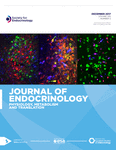- Made available online as an Accepted Preprint 16 February 2009
- Accepted Preprint first posted online on 16 February 2009
Cortisol mobilizes mineral stores from vertebral skeleton in the European eel: an ancestral origin for glucocorticoid-induced osteoporosis?
- Miskal Sbaihi1,
- Karine Rousseau1,
- Sylvie Baloche1,
- François Meunier1,
- Martine Fouchereau-Peron1,2 and
- Sylvie Dufour1
- 1Muséum National d'Histoire Naturelle, DMPA USM 0401, UMR 7208 CNRS BOREA ‘Biologie des Organismes et Ecosystèmes Aquatiques’, 7 rue Cuvier, CP 32, 75231 Paris Cedex 05, France2Marine Station of Concarneau, 29182 Concarneau Cedex, France
- (Correspondence should be addressed to S Dufour; Email: dufour{at}mnhn.fr)
Abstract
Endogenous excess cortisol and glucocorticoid (GC) therapy are a major cause of secondary osteoporosis in humans. Intense bone resorption can also be observed in other vertebrates such as migratory teleost fish at the time of reproductive migration and during fasting when large amounts of calcium and phosphate are required. Using a primitive teleost, the European eel, as a model, we investigated whether cortisol could play an ancestral role in the induction of vertebral skeleton demineralization. Different histological and histomorphometric methods were performed on vertebral samples of control and cortisol-treated eels. We demonstrated that cortisol induced a significant bone demineralization of eel vertebrae, as shown by significant decreases of the mineral ratio measured by incineration, and the degree of mineralization measured by quantitative microradiography of vertebral sections. Histology and image analysis of ultrathin microradiographs showed the induction by cortisol of different mechanisms of bone resorption, including periosteocytic osteolysis and osteoclastic resorption. Specificity of cortisol action was investigated by comparison with the effects of sex steroids. Whereas, testosterone had no effect, estradiol induced vertebral skeleton demineralization, an effect related to the stimulated synthesis of vitellogenin (Vg), an oviparous specific phospho-calcio-lipoprotein. By contrast, the cortisol demineralization effect was not related to any stimulation of Vg. This study demonstrates GC-induced bone demineralization in an adult non-mammalian vertebrate, which undergoes natural bone resorption during its life cycle. Our data suggest that the stimulatory action of cortisol on bone loss may represent an ancestral and conserved endocrine regulation in vertebrates.
- Received in final form 3 February 2009
- Accepted 13 February 2009
- © 2009 Society for Endocrinology











